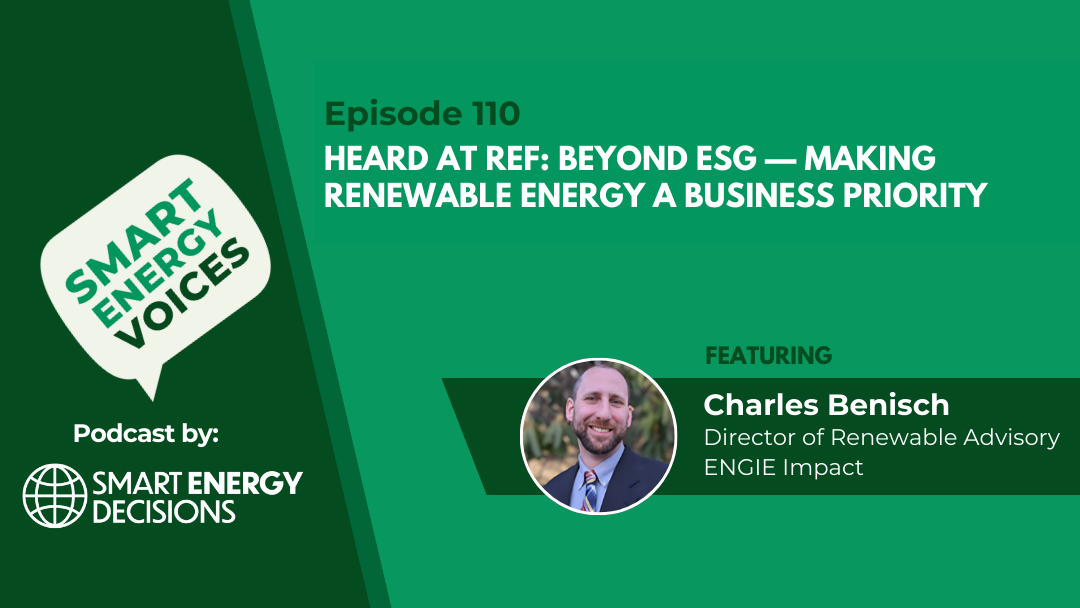Smart Energy Voices - Episode 110
Episode 110: Heard at REF: Beyond ESG — Making Renewable Energy a Business Priority

Listen on your Preferred Podcast Player »
In this episode of Smart Energy Voices, Charles Benisch, Director of Renewable Advisory at ENGIE Impact, covers how to move from admirable renewable energy goals to actionable strategies that align with executive priorities, as well as the rising risks of climate-related lawsuits, the impact of skyrocketing energy costs, and the looming pressure on supply chains. For organizations committed to sustainability, he outlines how innovative solutions like community solar programs and tax credit transfers can be leveraged to create budget-free paths to achieving green goals while still benefiting the bottom line.
You will want to hear this episode if you are interested in...
- The concept of exponential growth in the renewable energy industry (02:18)
- Challenges in scaling renewable energy (03:45)
- Climate-related risks, lawsuits,and reputational risks (05:29)
- Energy costs and operating profits (11:12)
- Scope 3 emissions and supply challenges (14:07)
- The use of tax credits to support sustainability goals (18:54)
- Flexible solutions for advancing renewable energy (23:32)
The Impact of Exponential Growth
Benisch illustrates the power of exponential growth versus linear growth through a thought experiment and connects it to climate change and energy consumption, noting that exponential increases in temperature and energy use can lead to significant impacts. Benisch emphasizes that while linear thinking might seem straightforward, exponential growth demonstrates the profound implications of compound growth in both environmental and business contexts.
Common Challenges in Scaling Renewable Energy
Benisch addresses the challenge organizations face in meeting ambitious renewable energy and greenhouse gas reduction targets without sufficient budget allocation. He focuses on aims on three key areas: organizational design, connecting renewable energy to executive priorities, and developing a budget. He also emphasizes the importance of linking renewable energy to C-suite priorities to foster a mix of solutions that address profit, risk and compliance. Benisch notes the need to simplify complex concepts like compound growth rates to effectively communicate and address environmental and financial challenges.
Climate-Related Risks, Lawsuits and Reputational Risks
Benisch notes that while presenting the risks of fossil fuel consumption in terms of environmental stress and operational impact can be compelling, it often fails to convince executives due to a perceived disconnect between individual or corporate actions and tangible risk reduction. He argues that more persuasive risks include climate-related lawsuits and financial penalties, which are growing in number and severity. In 2022 alone, over 2,000 climate-related lawsuits were filed against various industries, revealing substantial reputational and financial risks for organizations with inadequate or unproven climate commitments.
Energy Costs and Supply Challenges
Benisch shares several key risks and considerations related to energy costs and operational profits. He talks about the recent shifts in energy demand, which places significant pressure on existing renewable energy infrastructure and could lead to higher energy costs. He also addresses the financial impact of these shifts, emphasizing the need to consider the broader financial implications of transitioning to renewable energy, particularly how it affects operating profits and revenue.
Traditional business cases for renewable energy investments may not always resonate with executives who focus on profitability and cost management, and Benisch suggests that integrating renewable energy into business strategies requires a clear understanding of its impact on costs, revenues and risk management.
Benisch points out that Scope 3 emissions and associated risks are becoming increasingly significant. He also highlights the financial challenges associated with funding renewable energy initiatives, noting that expenses for renewable energy credits (RECs) can directly affect net profits, making it crucial to justify these costs in terms of long-term benefits and risk mitigation.
Flexible Solutions and Limitations
Benisch explains that the IRA allows companies to utilize tax credits at a discount, which can create significant financial benefits and support sustainability efforts without impacting the budget. The benefit can be used to buy renewable energy credits (RECs), finance energy efficiency projects, electrify processes or directly increase profits.
Benisch reiterates that while tax credit solutions provide a flexible, budget-free approach to support sustainability goals, they have limitations. Therefore, it’s crucial to view these solutions as part of a broader portfolio strategy, balancing various tools like tax equity investments, community solar and virtual power purchase agreements (VPPAs) to address profitability, risk management and compliance requirements.
Connect with Charles Benisch
Charles Benisch is the Director of Renewable Advisory at ENGIE Impact where he helps F500 companies and institutional buyers develop and manage renewable energy portfolios. Charles brings 12+ years’ experience in the renewable energy market, and he specializes in the development of renewable energy strategies that reduce cost, drive earnings, and manage risk. Building upon years in product development and commercial strategy at two of the world’s largest renewable advisory companies, Charles is an expert in helping clients develop business cases, communicate value internally, and align stakeholders. Prior to his role at ENGIE Impact, Charles helped build and scale Enel X’s renewable advisory practice.
- Smart Energy Decisions
-
Follow us on LinkedIn
Subscribe to Smart Energy Voices on
If you're interested in participating in the next Smart Energy Decisions Event, visit smartenergydecisions.com or email our Community Development team at [email protected]
Apple Podcasts, Google Podcasts, Android, Spotify, Stitcher, TuneIn Radio, aCast, PlayerFM, iHeart Radio











